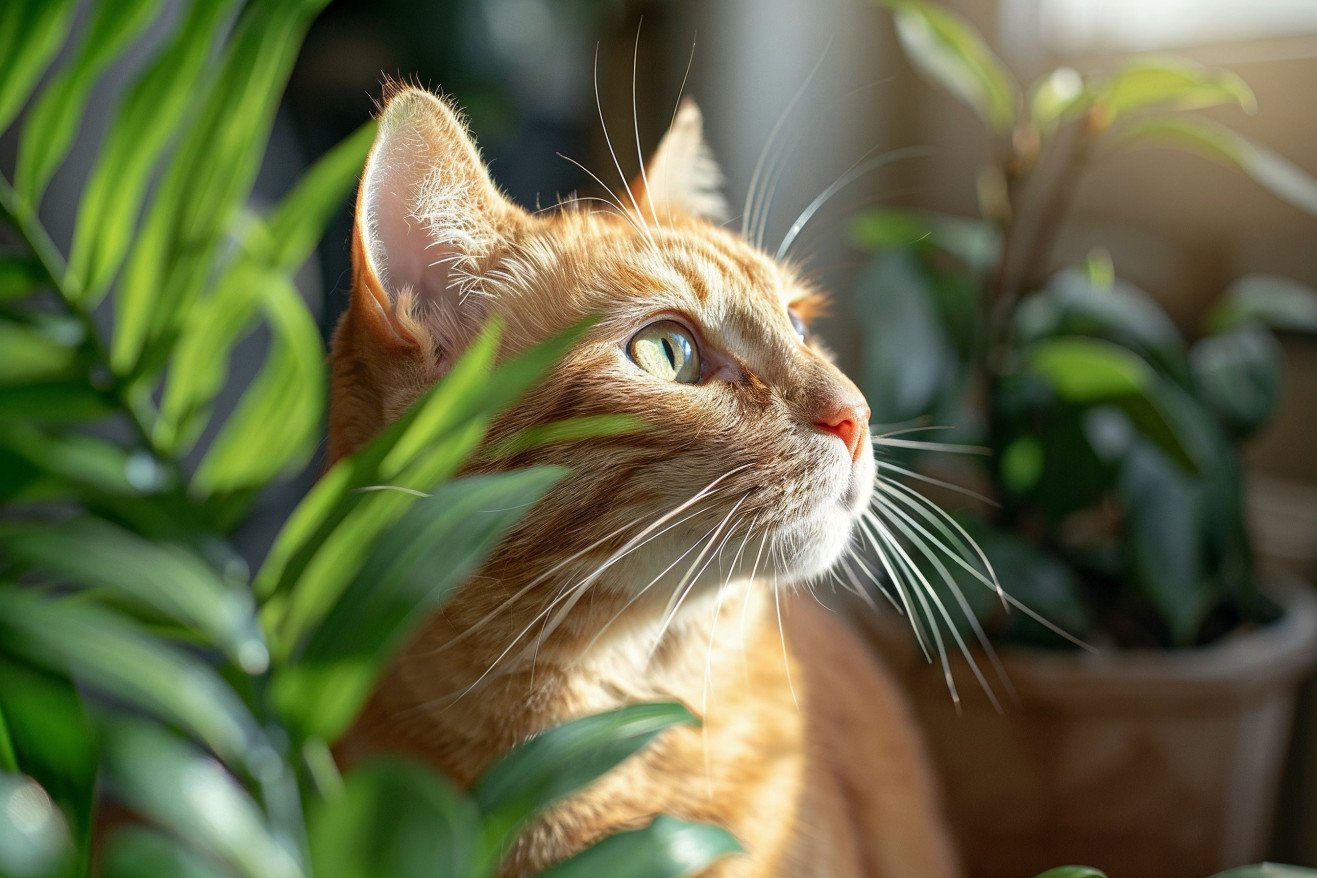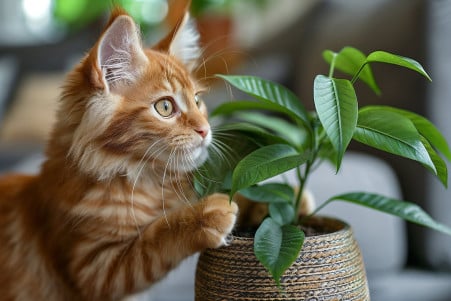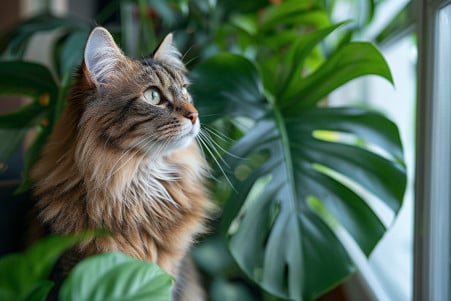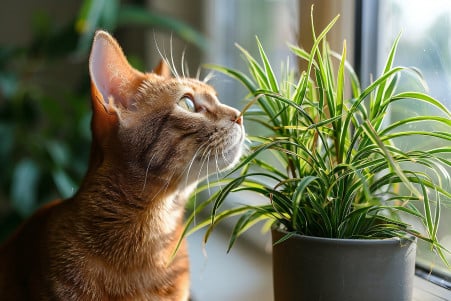Do Majesty Palms Hurt Cats? A Guide to Pet Safety
6 April 2024 • Updated 4 April 2024

Majesty Palms are a popular choice for indoor plants and can help bring a tropical feel to your home, but are they safe for your cat to nibble on if they get curious? Luckily, the ASPCA says that Majesty Palms (Ravenea rivularis) are non-toxic to cats. That said, if your cat eats enough of any plant, it can still lead to an upset stomach or blockage, so you should still discourage your cat from eating your indoor plants.
In this article, we'll explore expert advice on how to make sure your cat and Majesty Palm can live in harmony in your home. By referencing vets and plant databases, we'll cover any potential, albeit minimal, dangers and how to prevent your cat from eating your plants. By taking the right steps, you can safely incorporate these beautiful, pet-friendly plants into your home without having to worry about your cat's safety.
Are majesty palms toxic to cats?
Toxic Houseplants: A List for Cat Parents
Despite the fact that majesty palms are non-toxic, there are many popular houseplants that can be toxic to cats. Preventive Vet lists lilies, aloe vera, sago palms, and philodendrons as some of the most common houseplants that are toxic to cats. Lilies can cause kidney failure, philodendrons can cause gastrointestinal issues, and oleander plants can cause heart problems, according to The Spruce's toxic plant guide.
Signs that a cat may have been poisoned by a plant include vomiting, diarrhea, lethargy, difficulty breathing, and drooling, according to Hill's Pet. With so many popular houseplants that are toxic to cats, it's important for cat parents to carefully research plants before buying them. By making sure that toxic plants are out of their cat's reach, cat parents can help ensure that their pets don't accidentally ingest anything that could harm them.
How to Tell If Your Cat Has Been Poisoned by a Plant
The symptoms of plant poisoning in cats can vary depending on the plant and the amount that was ingested. According to PetMD, common symptoms of plant poisoning include vomiting, diarrhea, drooling, difficulty swallowing, and lethargy. In more serious cases, cats may experience changes in heart rate, seizures, and respiratory distress.
Lilies are especially toxic to cats, and according to Cats Protection, all parts of the lily plant are poisonous to cats and can cause kidney failure. If you think your cat has been poisoned by a plant, The Healthy Pet Club recommends taking them to the vet as soon as possible, as this will give them the best chance of making a full recovery.
The sooner you can recognize the signs of plant poisoning and get your cat the care they need, the better their chances of recovering. With a little awareness and preparation, cat owners can help protect their pets from the dangers of poisonous houseplants.
How to Make Your Home Safe for Cats: Tips and Strategies
To keep cats safe from poisonous plants, it's important to cat-proof your home. As noted by The Spruce, smells like citrus juice or vinegar diluted with water can be used to discourage cats from chewing on plants. You can also place pinecones or rocks on top of the soil to keep cats from using the plant as a bathroom.
For an extra layer of protection, Zoetis Petcare suggests moving toxic plants to areas that cats can't reach or getting rid of them altogether. They also recommend providing cats with safe, non-toxic alternatives like cat grass or catnip to chew on. Meanwhile, Hill's Pet advises checking plants for damage regularly and adjusting protective measures as necessary.
These steps can help cat parents make sure that their cats and their plants can coexist in their home in peace. With the right precautions, cats and plants can live in harmony.
Pet-Friendly Houseplants: Safe and Stylish Options
Although there are some houseplants that can be dangerous to cats, there are also many non-toxic, pet-friendly options that cat owners can choose from. According to Architectural Digest, some of the safest houseplants for cats include spider plants, Boston ferns, and succulents. Meanwhile, the BBC Gardeners' World Magazine lists a number of cat-friendly plants that are safe for cats, including calathea, parlor palms, and watermelon peperomia.
When choosing houseplants that are safe for cats, it's important to think about things like the plant's size, how it grows, and how much care it will need. According to Prevention, it's also a good idea to check reputable sources like the ASPCA's toxic plant list to make sure a plant is safe before you buy it. However, with a little research, cat owners can find houseplants that will allow them to enjoy the benefits of indoor greenery without worrying about their cat's health.
Conclusion: How to Protect Your Cats and Your Houseplants
Even though the ASPCA has deemed majesty palms to be non-toxic to cats, it's still important to note that any plant material can cause gastrointestinal upset if consumed in large enough quantities. Catster notes that while not poisonous, majesty palms can still cause minor issues if ingested, such as irritation or discomfort.
That said, it's still important to make sure that cats don't eat houseplants, even if they're non-toxic like majesty palms. Many common houseplants are toxic or poisonous to cats and can cause serious health issues. Preventive Vet lists lilies, aloe vera, sago palms, and philodendrons as some of the most dangerous plants to have around cats.
If cats eat these plants, they can experience problems like kidney failure, gastrointestinal upset, and heart issues. PetMD lists the most common signs of plant poisoning in cats as vomiting, diarrhea, lethargy, and difficulty breathing. If you think that your cat has eaten a toxic plant, it's important to get them to the vet right away.
With the right planning and plant choices, cat owners can enjoy the benefits of houseplants without putting their pets in danger. It's also important to stay aware and be willing to make changes over time. By making sure that their cats are safe and healthy, pet parents can create an environment that's enriching for everyone.


